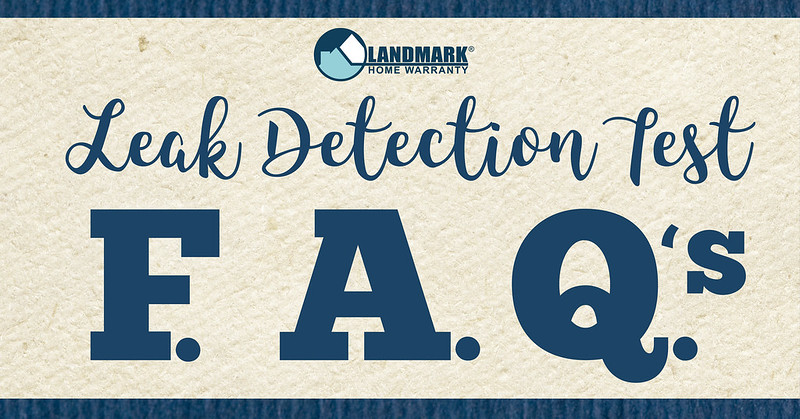
THE MATERIAL CONTAINED IN THIS ARTICLE IS PROVIDED FOR GENERAL INFORMATION PURPOSES ONLY AND DOES NOT CONSTITUTE PROFESSIONAL ADVICE.LANDMARK HOME WARRANTY DOES NOT PURPORT TO BE A SUBJECT MATTER EXPERT WITH REGARD TO THIS MATERIAL, AND YOU SHOULD CONDUCT YOUR OWN RESEARCH AND/OR SEEK THE ADVICE OF APPROPRIATELY QUALIFIED PROFESSIONALS WITH REGARD TO YOUR SPECIFIC CIRCUMSTANCES BEFORE YOU TAKE ACTION. LANDMARK HOME WARRANTY ASSUMES NO RESPONSIBILITY, AND SPECIFICALLY DISCLAIMS ALL LIABILITY, FOR YOUR USE OF ANY AND ALL INFORMATION CONTAINED HEREIN.
If you've ever experienced a broken HVAC system in the middle of summer, you know how hot and uncomfortable you can get. There are a number of reasons an HVAC system may fail, and one of them could be leaking refrigerant.
How your HVAC System Works: The Basics
If you have a forced-air system, your air conditioner works through three basic steps.
First, a gas called refrigerant or Freon is compressed in a compressor and compressor coils in a unit usually found outside of your home. When refrigerant is compressed, it releases heat, cooling down to extremely cold temperatures.
Next, the compressed and cooled refrigerant travels inside of the home to the evaporative coils. These coils are next to a fan. The fan blows warm air from your home past the cold evaporative coils, cooling the air. The air is blown throughout your home.
Finally, as the refrigerant begins to decompress and regain the heat it gave off, it travels back to the compressor outside to complete the process again, until your home is the desired temperature.
Refrigerant is really what makes your air conditioning decrease the temperature in the air and cool your home. Without refrigerant in the system, the air that's blown past your evaporative coils and throughout your home isn't cool. Although the refrigerant in the system is in a looped system (meaning the refrigerant continues to go to the compressor to the evaporative coils and back to the compressor without any entry or exit points) this loop can develop pin-sized holes over time that leak refrigerant.
Why is a Leak Detection Test Necessary?
If your air conditioning system stops working and an HVAC tech diagnosis the problem as low refrigerant, you'll obviously want them to refill your refrigerant. Even though this will get your air conditioning up and working again, blowing cold air, this is just a Band-Aid solution to the real problem: finding and fixing the leak. By just filling up the system with new refrigerant, you'll end up having to continue to buy more and more refrigerant as it continues to leak out of your system.
This is where a Leak Detection Test comes in. HVAC technicians have a number of different methods that we will discuss a bit further on in this article that help them find where your system is leaking refrigerant. By completing a thorough test, they can repair the leaks, sealing the refrigerant inside of the system and ensuring that your keep you cooler for a longer time.
Why is a Leak Detection Test so Costly?
Unfortunately, since most of these leaks are pin-sized holes, it can be extremely difficult to detect where the leak is coming from. It takes a long time and a number of different types of tests to determine where your system is losing refrigerant. Refrigerant lines are often inaccessible, in ceilings, walls and other hard to reach places where the HVAC technician may not be able to repair without opening holes in your walls and ceilings. Not only does this mean a lot of frustration on your end, but also higher costs simply because it's such a difficult process.
What Types of Leak Detection Tests Are There?
There are a wide variety of leak detection tests. Which one the technician uses for your system depends on what type of system and refrigerant you have and where the technician thinks the leak may be. Here are a few types of leak detection tests your technician may complete:
Bubble Solution
This is the simplest leak detection test. With access to accessible refrigerant lines, the technician is able to place a bubble solution on the line. If the line begins to bubble, the technician can tell that the gas is leaking out of the line and can patch the hole.
Fluorescent Leak Detection
If your technician refills your refrigerant and they suspect there's a leak, they'll most likely include some fluorescent dye with the refrigerant. They'll come back later to use a UV light and see if any of the dye has leaked out of the lines. Once they find where the dye is located, they can easily locate and repair the leak. However, there are different dyes for different systems and refrigerants, and using the wrong dye with the wrong system can ruin an entire air conditioning system. That's why it's extremely important to hire a qualified technician.
Halide Torch
A halide torch has a flame that, when it comes in contact with chloride atoms, turns green. However, this isn't always an effective test because not all refrigerants have chloride.
Electronic Detectors
There are a few different types of electronic detectors. One, the corona-suppression uses an electric current to detect leaks. When the electric current drops, gas is detected. The lower the drop in electric current, the higher the amount of gas.
A heated diode detector heats the refrigerant and breaks the molecules into negative and positive charged atoms. The positive atoms in the gas will attach to the negatively charged wire on the detector, and the detector will sense them, showing a gas leak when the detector goes off.
Ultrasonic Detector
An ultrasonic detector can hear where the gas is escaping in the line, even with pinhole sized leaks.
Can I Complete a Leak Detection Test Myself?
You may see some of these tests, look at the cost for your technician to complete the test, and s ay, "I want to just do this myself!"
As tempting as that is, don't be tricked into trying to attempt a leak detection test by yourself. Not only can you ruin your system by putting in dyes and solutions that may stop it from working, but you can also endanger yourself by using these tools that you may not have experience with and trying to get into places you can't reach. Please hire a technician to complete these tests for your own safety, and so you don't have to buy an entirely new HVAC system after attempting.
Why Landmark Doesn't Cover for Leak Detections
Although Landmark does cover for leaks in accessible refrigerant lines, we do not cover for leak detection tests. Some homeowners may wonder why Landmark doesn't cover this option for our customers. It all boils down to cost savings on your end, and providing trusted contractors.
At Landmark, we try to provide cost-effective savings for you. To keep premiums low, there's simply no way to provide coverage for every possible part of your home, your systems and your appliances. Our yearly premiums would be sky-high if we did. One of the things we do not provide coverage on is accessibility. If a Landmark technician has to open up a wall, ceiling, roof, etc. to get to a refrigerant line, our contract states we will not cover the leak. As most leak detection tests have to open your walls, ceilings, floors etc. simply to see where the leak is and repair it, we do not cover these due to accessibility issues. If we covered things like wall tear down and repairs in our coverage, our yearly premiums would be costlier.
Landmark also hires contractors who are vetted as the top companies to repair and replace your failed systems and appliances. At this time, we do not have contractors who specialize in these types of repairs.
If you are interested in learning more about home warranties, or what we do cover on your specific home, please get a personalized plans and pricing sheet by going to Landmark's compare plans page, here.
Photos in the Infographic are real products and can be found here, however, remember you should not buy these yourself and use them. Using one of these tests on a system that cannot handle it, can ruin your entire HVAC unit.
HVAC Articles
How does your air conditioner work? What can you do to make sure your HVAC system keeps running for its entire lifespan? These articles will help answer your questions about the heating and cooling systems in your home
Subscribe to our Resources Newsletter
Don't miss out on our monthly newsletter! Sign up to get tips on everything about home ownership, from maintenance tips to home selling advice delivered to your email once a month.
Get a Free Home Warranty Quote!
Input your information and get a free, personalized home warranty quote. You can customize the coverage and pricing to fit your needs. Experience what over 70,000 homeowners already know: A Landmark Home Warranty helps provide protection for your home and budget!


